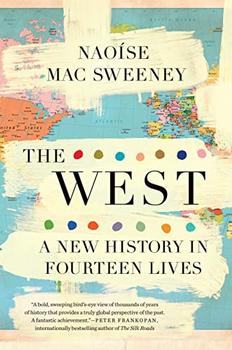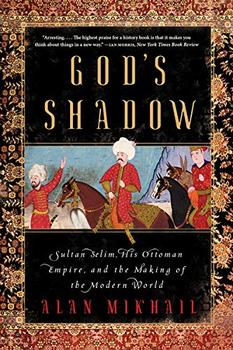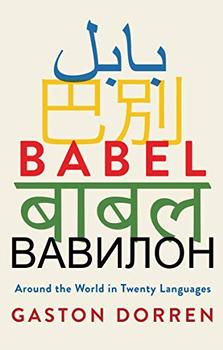Summary | Excerpt | Reviews | Beyond the book | Read-Alikes | Genres & Themes | Author Bio

A New History in Fourteen Lives
by Naoíse Mac SweeneyIt's become common for history books and courses to reconsider the emphasis on "Western Civilization" that dominated education for decades, including its canon of mostly white male authors who celebrated the West as superior to all other regions and peoples. It's also common to witness a backlash against that reconsideration, which comes complete with hand-wringing over cultural relativism and laments about de-valuing Western heritage. As Naoíse Mac Sweeney shows in her latest book, however, this heritage, based on Greco-Roman antiquity and taught as the bastion of culture for western Europe and North America, is actually a rather recent development in a much longer and more complex story. By profiling fourteen individuals—some well-known, others obscure—she uses their lives and works as examples of the cultural milieu in which these individuals lived. Through them she demonstrates that cultural heritage is much more interconnected and nuanced than most "Westerners" may realize.
She begins with the historian Herodotus in ancient Greece and then Livilla, who was a relatively unknown member of the Roman imperial family. She shows that ancient Greece and Rome were not monolithic cultures, and in fact that the foundations of "the West" were quite diverse. The writings of Herodotus reveal a multi-ethnic Greek world where early democracy was anything but universal. Likewise, readers learn that the Roman Empire was closely tied to Trojan origin myths, thereby aligning itself closely to Asian foundations since the mythical city of Troy was said to be located on the eastern side of Anatolia.
She goes on to show the centrality of the Middle East and Islamic cultures to the preservation of ancient Greek scholarship and continued advancement of science through the biography of the Arabic scholar al-Kindi. She also dispels the myth of a "clash of civilizations" during the Crusader period of the 11th through the 13th centuries. Quite contrary to a simplistic "us versus them" conflict, she shows via Italian diplomat Godfrey of Viterbo and exiled Byzantine emperor Theodore Laskaris that European monarchs consistently referenced Trojan/Asian roots, whether real or not, to bolster their royal credentials. What's more, warfare and conquest between Byzantine Greeks and western Europeans was just as violent as that which took place between Christians and Muslims in the Holy Land. These chapters are an important corrective to overly simplistic interpretations of the medieval period, and they introduce readers to people and places they don't often learn about outside of college-level history courses.
Mac Sweeney then turns to the Renaissance and Enlightenment periods, and readers can see the narrative of "the West versus the rest" begin to take shape. It was still malleable during the lifetimes of Renaissance poet Tullia D'Aragona (see Beyond the Book) and Safiye Sultan, the queen mother of the Ottoman Empire who cultivated alliances with Elizabeth I. This narrative further solidified in the 17th century, as seen through Francis Bacon, an English philosopher and politician who helped develop what we call the scientific method. His writings exemplified the new emphasis on Greco-Roman heritage for European countries that were becoming colonial powers. Crucially, Mac Sweeney shows how in the 16th and 17th centuries it was still possible to be an "outsider" and claim a part of that heritage—her chapter on African queen Njinga demonstrates how Christianity was still a pathway to acceptance as a Westerner.
By the 18th century, however, "the West" as a cultural concept had coalesced in Europe and the newly independent United States. The author deftly shows that as colonialism expanded and the US grappled with slavery and its expansion over indigenous populations, white Europeans and their descendants more stridently defined themselves against enslaved or subjugated "others." With Christianity split into numerous Protestant groups plus Catholics, white racial characteristics and Greco-Roman roots became the glue holding dominant cultures together.
The lives of American revolutionary preacher Joseph Warren and British prime minister William Gladstone show how this narrative allowed western European and American elites to overcome the inherent contradictions in expounding democratic principles while conquering and enslaving other societies. As she explains, "Thanks to the ideas promoted by men such as Warren, the revolutionaries could comfortably agitate for their own freedom on the basis of their Western heritage, without necessarily extending that freedom to others, and they could decry the subjugation of themselves, as Westerners, to imperial oversight, without rejecting the principle of imperialism in itself." The inclusion of a chapter on Phillis Wheatley, an accomplished poet and former enslaved Black woman, is an excellent juxtaposition to show how race, by the 18th century, became a defining feature excluding "others" from Western heritage, no matter their intellectual achievements.
Mac Sweeney concludes by acknowledging the criticisms of the idea of "the West" and its supposed cultural superiority, first through the life of public intellectual Edward Said in the 20th century and lastly with Hong Kong chief executive Carrie Lam in the 21st. Through the latter, the author explains a problematic counternarrative emerging from the Chinese government that culture is universally unchanging and static, which does nothing to overcome cultural barriers or foster genuine exchange.
She leaves the reader with the notion that "the shape of history is different depending on your vantage point," which is a central tenet of historical study and an important reminder that reading history is so often a mirror of our own values and expectations. The greatest facet of this book is how it encourages readers to consider a more nuanced, interwoven history that, by re-evaluating the past with the full breadth of our knowledge, pays tribute to the very ideals of Western Civilization while broadening what that definition really means.
![]() This review
first ran in the May 17, 2023
issue of BookBrowse Recommends.
This review
first ran in the May 17, 2023
issue of BookBrowse Recommends.

If you liked The West, try these:

by Alan Mikhail
Published 2021
An explosive global history that redefines the historical origins of the modern world through the life of Sultan Selim I and his Ottoman Empire.

by Gaston Dorren
Published 2019
Witty, fascinating and utterly compelling, Babel will change the way you look at and listen to the world and how it speaks.
Beware the man of one book
Click Here to find out who said this, as well as discovering other famous literary quotes!
Your guide toexceptional books
BookBrowse seeks out and recommends the best in contemporary fiction and nonfiction—books that not only engage and entertain but also deepen our understanding of ourselves and the world around us.